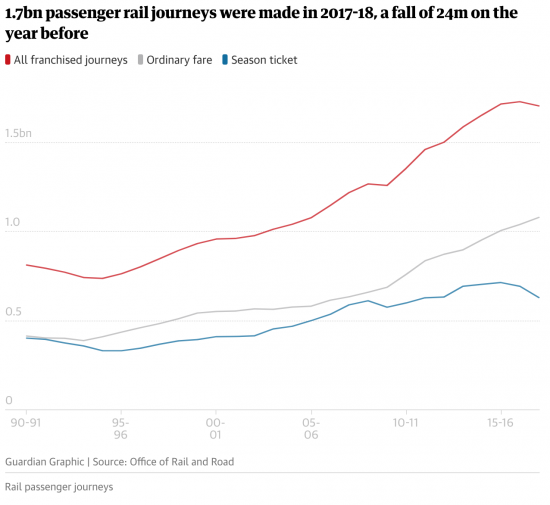The Guardian has published this graphic based on newly published data on rail travel:
The evidence of a downturn in commuting appears very clear. Whilst one-off rail journeys continue to rise, which is welcome given they are better environmental alternative to cars, commuter traffic is falling. And this is equally welcome: there is no joy in commuting. IT is liberating many of us (me included for much of the year) from the need to be physically present at work.
This, however, has important ramifications. Almost all businesses assume ever-rising demand for their product, and rail franchises have almost universally been granted on the basis that this is the case for rail travel. If it is not true then many of those franchises will fail.
That does not mean we no longer need railways. Or that the railway industry has failed: it will not have done so. All that will be proven is that private rail operators have limited commercial aptitude, and the model within which they work has little commercial merit.
The alternative is, of course, state ownership. Labour has to do very little, I suspect, to promote this now. Over the next few years rail franchise operators will be queueing up to hand back the keys to their trains.
Thanks for reading this post.
You can share this post on social media of your choice by clicking these icons:
You can subscribe to this blog's daily email here.
And if you would like to support this blog you can, here:




The fall off in commuting has been attributed to rising season ticket prices.
No doubt I have the numbers wrong, but as I recall, the train operators extract about £200m profit a year, while the government subsidizes the train network by about £8bn a year. So the train operators’ profit is really just subsidy, which the government can raise or lower arbitrarily. It’s just another outsourced service, making an arbitrary level of profit. To demonstrate this: part of the HS2 budget is £11bn saved by cancelling inter-city services. The government saves money by not having to subsidize these trains.
The various franchises do not interact well and a lot of capacity is lost through inefficient timetabling.
As a seasoned railway buff you’ll know considerably more than me but hasn’t the history of the railways since 1830, been something of a roller-coaster – cyclically going from cash-cow to bankruptcy; with government having to step in routinely to keep the trains on the tracks, until a new ‘raison d’être’ has been developed, from moving freight, to people, to vacations, to speed, to soccer fans, to commuting, to more environmentally friendly travel, to …. whatever comes next.
As the petrol-driven auto industry became both its main challenger and more recently its salvation (re. commuting, costs, pollution) the rail industry is once again at one of its critical points. Self-drive electrical cars will surely have an impact as will the changing nature of city life. So, for me , it makes logical (as opposed to ideological) sense for the government to take back control and redesign a radical new rail network to meet the socio-economic needs of future generations.
Although it was atypically private enterprise that developed and built the original railways, it wasn’t long before the government had to get involved via the Railway Regulation Act of 1840. Because today’s situation is exponentially more complex and costly I can’t see a constructive rôle for private enterprise. Richard Branson’s entrepreneurial financial model should be proof enough.
Whatever the macro outcome, I pray the micro heritage steam companies will go from strength to strength 🙂
We need a macro solution
And remember, even the micro railways cooperate heavily
I fear that the downturn in commuting represents a general downturn in the economy: fewer jobs to commute to, less work with a wage that would pay for the ticket, let alone justify the misery of it.
Maybe
But I am not entirely convinced
“capacity is lost through inefficient timetabling”
Most land based travel needs to be public transort powered by renewable electricity and bus timetables need to be coordinated with rail.
Just supposing enough of us realised that average world temperatures are rising, the Antarctic and Greenland ice-sheets are melting, storms are more severe, sea-level is rising faster than it was and that ‘greenhouse gas’ emissions need to be cut to zero – or very close – in double quick time.
To cut transport emissions, aviation needs to be cut towards zero (which means that airports like Heathrow should contract rather than expand).
When aviation, shipping and net ‘imported emissions’ are included, UK emissions are still rising.
And economists still advocate growth. Why?
The situation is far more serious than it was in war-time when we had rationing.
If enough of us realised … we would need tradeable energy rationing. [Tradeable Energy Quotas (TEQs) flemingpolicycentre.org.uk/teqs/ or http://www.tyndall.ac.uk/publications/tyndall-working-paper/2009/personal-carbon-trading-critical-examination-proposals-uk%5D
There is some progress but it is slow. Slow progress guarantees defeat.